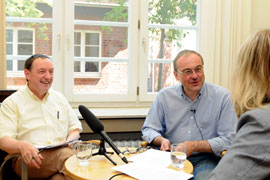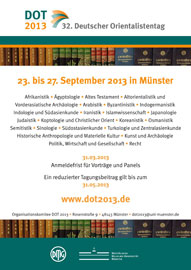“Resolving Misconceptions about the Orient”
1,000 participants are expected at the largest German Oriental Studies Conference in Münster

Interview with Prof. Dr. Reinhard Emmerich and Prof. Dr. Thomas Bauer about the 32nd German Oriental Studies Conference
More than 1,000 Oriental scholars from home and abroad are expected to participate in the largest German Oriental Studies Conference (Deutscher Orientalistentag, DOT), which will be held in mid-September at the University of Münster. The scholars will present recent research results about cultures in Asia, Africa and Arab regions in about 900 lectures and 80 panels. “The spectrum ranges from basic research to contemporary issues such as the Arab revolutions, the politics of Iran, Islamic environmental movements, or Chinese people in multinational companies”, explains Sinologist Prof. Dr. Reinhard Emmerich, the head of the DOT committee. Arabist Prof. Dr. Thomas Bauer adds that the German image of the Orient is heavily shaped by stereotypes. Ideas of an “intolerant Islam, ahistorical Africa or evil China” predominate. The DOT can contribute to resolving misconceptions.
The German Oriental Society (Deutsche Morgenländische Gesellschaft, DMG) invites to the 32nd DOT at the University of Münster, taking place from 23 to 27 September. It is aimed at the professional and interdisciplinary exchange of experienced and young Oriental scholars from all over the world. The programme of the conference is as comprehensive as no other DOT before. The sections represented most strongly are Indology, Islamic Studies as well as Politics, Economy and Society, followed by Sinology, Iranian Studies, Turkish Studies and Arab Studies. Among the speakers are top-class guests such as Sinologist Prof. Dr. Wilt Idema and the Ottoman scholar Prof. Dr. Cemal Kafadar from Harvard, Byzantinist Prof. Dr. Hugh Kennedy from London, art historian Prof. Dr. Robert Hillenbrand from Edinburgh, the Freiburg Indologist Prof. Dr. Oskar von Hinüber and the Berlin Islamic scholar Prof. Dr. Gudrun Krämer, who will give the public evening lecture on the topic of “Arcs of suspense: Islam, secularisation and the secular principle”. A framework programme including a concert and an exhibition is also scheduled.
Exchange with the Asian and the Arab world
“If Europe wants to get along with China, Japan, India or Arab countries politically and economically, it should demonstrate genuine respect for their culture”, emphasises Prof. Emmerich. Earlier great minds like Bertolt Brecht or Friedrich Rückert were deeply influenced by the Orient. This is missing today. The promotion of research on Oriental countries and cultures at German universities is all the more important. “We draw conclusions from the knowledge of history about the present. The present politics and culture in Asia or in the Middle and Far East can only be understood by looking at them through the eyes of these cultures. This is no different there than it is here.”
Hence, international exchange is also important, as Prof. Bauer underlines: “The humanities in the Arab world receive less promotion than they do here. Nevertheless, research is done there, and we keep exchange alive. Internationalisation is part of our everyday life.” Prof. Emmerich says: “In China, Japan and Taiwan, the humanities are held in very high esteem. It is not correct that research is impossible because of political reasons.”

Poster
Indian inscriptions, Coptic dialects
Indian inscriptions, Coptic dialects or Buddhist polemics: many results of current basic research will be presented at the Oriental Studies Conference, as DOT representatives explain. Disciplines such as Turkish Studies, Arab Studies and Islamic Theology will also assess the current situation of their field. The trend among many disciplines of considering themselves regional sciences for countries, which began 20 years ago, has declined again in favour of Philology, says Prof. Emmerich. “None of our fields could understand its sources without linguistics. Those who investigate the dissemination of Buddhism in Asia need a working knowledge of Sanskrit, Tibetan, Pali and Chinese. This requires discipline and a tolerance for frustration. Even the most experienced researcher often consults a dictionary.”
The oldest texts known to man are to be found among the objects of Oriental researchers, written in cuneiform and hieroglyphs, or also Aramaic, which has been investigated over a time span of 3,000 years, as Prof. Bauer explains. Field research on spoken dialects or fully unknown languages are added to that. “Moreover, we use methods from History, Law, Political Science and Literary Studies, and in addition, we deal with almost all religions: Buddhism, Hinduism, Shinto, Islam, Oriental Christianity. Interdisciplinary cooperation is decisive.”
The programme of the DOT is open to everybody who is interested. A conference fee is charged. The University of Münster, the Philologies Department, the Cluster of Excellence “Religion and Politics” and Münster Marketing promote the conference. (vvm)

